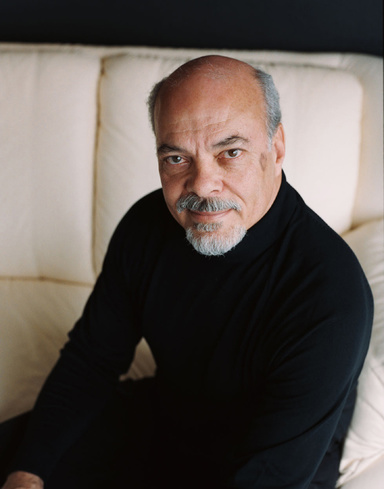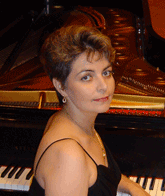The University of Iowa Symphony Orchestra, directed by William LaRue Jones, will be joined by School of Music faculty pianist Ksenia Nosikova from Russia when it opens its 2012-13 season of free concerts with an all-Russian program at 7:30 p.m., Monday, Sept. 24, in the Main Lounge of the Iowa Memorial Union.

The concert will open with the Symphony No. 9, op. 70, E-flat major, by Dmitri Shostakovich before Nosikova is featured in Prokofiev’s Piano Concerto, No. 3, op. 26, C major. The concert will conclude with one of the most popular works in the symphonic repertoire, the 1812 Overture, op. 49, by Tchaikovsky—celebrating heroic events that occurred 200 years ago.
Shostakovich is one of the most enigmatic musical personalities of the 20th century. His music, written under the tight and capricious artistic controls of Stalin’s Soviet Union, has bafflingly complex and often contradictory layers of meaning.
No work embodies the Shostakovich enigma better than the Ninth Symphony. It was written at the end of Word War II, at a time when Shostakovich was hailed as a Soviet hero.
It was expected that the ninth would be a monumental and joyful “victory symphony,” following the model of Beethoven’s Ninth. Instead, Shostakovich surprised Russian audiences with a short, lightweight, and apparently comic work that was startlingly out of step with the occasion.
The Ninth Symphony is now widely regarded as a calculated protest against the crushing expectation that had been placed on Shostakovich to contribute to the grandiloquent Soviet victory celebration, but his real intentions remain unknown.

In the piano concerto, Nosikova will play the solo part that Prokofiev himself played when the Chicago Symphony premiered the third concerto in 1921 and when the first recording of the piece was made in 1932—the only recording that exists of the composer performing any of his concertos. The work has gained the greatest popularity and critical acclaim generated by any of his five piano concertos.
Tchaikovsky wrote his festival overture, The Year 1812, to commemorate the 70thanniversary of Russia’s repulsion of Napoleon’s invasion. Of course, 2012 is the bicentennial of those events and the 130th anniversary of the work's premiere.
Through its frequent performances and many recordings, the 1812 Overture is a piece that everyone knows, memorable for its cannon volleys, ringing bells, and brass fanfare—which make it a rousing finale to any orchestral concert.
For this performance, live cannon shots will be sampled and reproduced by a computer through the venue's sound system.
That’s not all. “I have invited Wayne Thelander (Iowa City West High) and Megan Stucky (Iowa City High) to have some of their top students join us during the finale of the 1812 Overture," Jones says.
"We have also invited a special guest bass drummer to join the percussion section in the finale: Dr. Edgar Folk, a UI environmental physiologist, played percussion in the Harvard University Band under Leroy Anderson. He is 98 years old and still goes to work every day! He came to UI in 1954 and knew Himie Voxman well.”
Read bios of Jones and Nosikova on the School of Music website.
For accommodations at the event, contact the School of Music at 319-335-1603. The school is a unit of the Division of Performing Arts in the UI College of Liberal Arts and Sciences. For a UI arts calendar and event details visit the new Arts Iowa website.